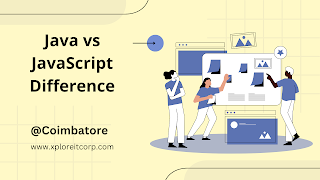Java vs JavaScript Difference
1. Overview of Java and JavaScript
Java and JavaScript are both useful programming languages, but they have different roles in software development. Java is mainly used for backend work and is a statically typed, object-oriented language. In contrast, JavaScript is a dynamically typed scripting language mainly for frontend development. Many people mix them up, so if you’re looking into Java courses in Coimbatore, it’s important to know the difference. Java training programs in Coimbatore often clarify this.
Key Points:
- Java is compiled; JavaScript is interpreted.
- Java is for backend; JavaScript is for frontend.
2. Syntax and Structure
The way Java and JavaScript are written is quite different. Java has a strict, class-based syntax, while JavaScript uses a more flexible, prototype-based syntax. This affects how code is written, read, and maintained. Java Full Stack Developer courses in Coimbatore usually teach both languages to prepare students for different tech roles. Most tutorials start with comparing their syntax.
Key Points:
- Java uses class-based OOP.
- JavaScript uses prototype-based OOP.
3. Web Development Usage
JavaScript is essential for making web pages interactive, while Java handles server-side logic. Full stack developers often need to know both languages, making a Java Full Stack Developer course in Coimbatore very useful. Knowing the Java vs JavaScript difference helps developers choose the right tool for their tasks.
Key Points:
- JavaScript enables frontend interactivity.
- Java manages backend applications.
4. Runtime Environments
Java runs on the Java Virtual Machine (JVM), meaning it's platform-independent, while JavaScript runs in web browsers and on Node.js for backend tasks. Java courses in Coimbatore usually emphasize the JVM's role. JavaScript's runtime is lighter, which speeds up simple scripts. Java training often begins with JVM basics.
Key Points:
- Java runs on JVM.
- JavaScript runs in browsers and Node.js.
5. Application Areas
Java is commonly used in enterprise apps, Android development, and backend systems. JavaScript rules the web development space, making user experiences better. If you take a Java Full Stack Developer course in Coimbatore, you’ll get to explore both. You can see the difference in what each language is best at.
Key Points:
- Java is great for Android and enterprise apps.
- JavaScript is best for web-based user interfaces.
6. Development Tools and IDEs
Java developers typically use tools like Eclipse, IntelliJ IDEA, or NetBeans, while JavaScript developers often prefer VS Code or Sublime Text. These tools are usually part of Java courses in Coimbatore, and training sessions also cover best practices. Learning both environments helps full stack developers work better.
Key Points:
- Java uses IDEs like IntelliJ.
- JavaScript uses lighter editors like VS Code.
7. Frameworks and Libraries
Java has frameworks like Spring, Hibernate, and JSF, while JavaScript has React, Angular, and Vue. Knowing which framework fits your project is key to understanding the differences between the two. A Java Full Stack Developer course in Coimbatore will provide practical training on both sets of frameworks.
Key Points:
- Java frameworks support backend development.
- JavaScript frameworks help with frontend UI.
8. Community and Job Demand
Both Java and JavaScript boast large communities and good job prospects. Java courses in Coimbatore often showcase job opportunities with real examples. They also provide guidance on certifications and building resumes. Full stack skills are sought after in tech jobs.
Key Points:
- Both Java and JavaScript have strong career opportunities.
- Full stack roles benefit from knowledge of both.
9. Performance and Security
Java is better for performance and security in enterprise applications, while JavaScript is quicker to implement but less secure for sensitive data unless you add extra layers. You’ll see the differences when picking technologies for projects in finance or e-commerce. Java Full Stack Developer courses often cover secure coding practices.
Key Points:
- Java is more secure and performant.
- JavaScript needs careful coding for safety.
10. Choosing the Right Language
Deciding between Java and JavaScript depends on your career goals and project requirements. If you're interested in backend and enterprise development, Java is the way to go. For dynamic user interfaces, JavaScript is better. Programs like the Java Full Stack Developer Course in Coimbatore offer training in both. For expert-led courses, check out Xplore It Corp for Java training in Coimbatore.
Key Points:
- Learning both gives you an edge in full stack development.
- Xplore It Corp offers solid training.
FAQs
What is the main difference between Java and JavaScript?
Java is a backend language that's statically typed, while JavaScript is used for frontend development and is dynamically typed.
Is it necessary to learn both Java and JavaScript?
Yes, full stack developers benefit greatly from knowing both languages since they work with both the client and server sides.
Which is easier to learn, Java or JavaScript?
JavaScript is easier for beginners. However, Java teaches deeper computer science concepts.
Are there jobs that need both Java and JavaScript skills?
Yes, full stack developer roles usually require knowledge of both.
Where can I get the best Java training in Coimbatore?
You can sign up at Xplore It Corp, which offers focused courses on Java and full stack development, along with placement support.



Comments
Post a Comment